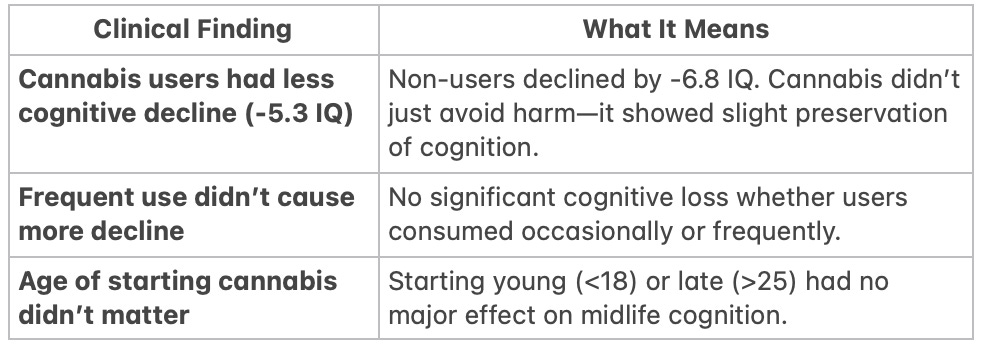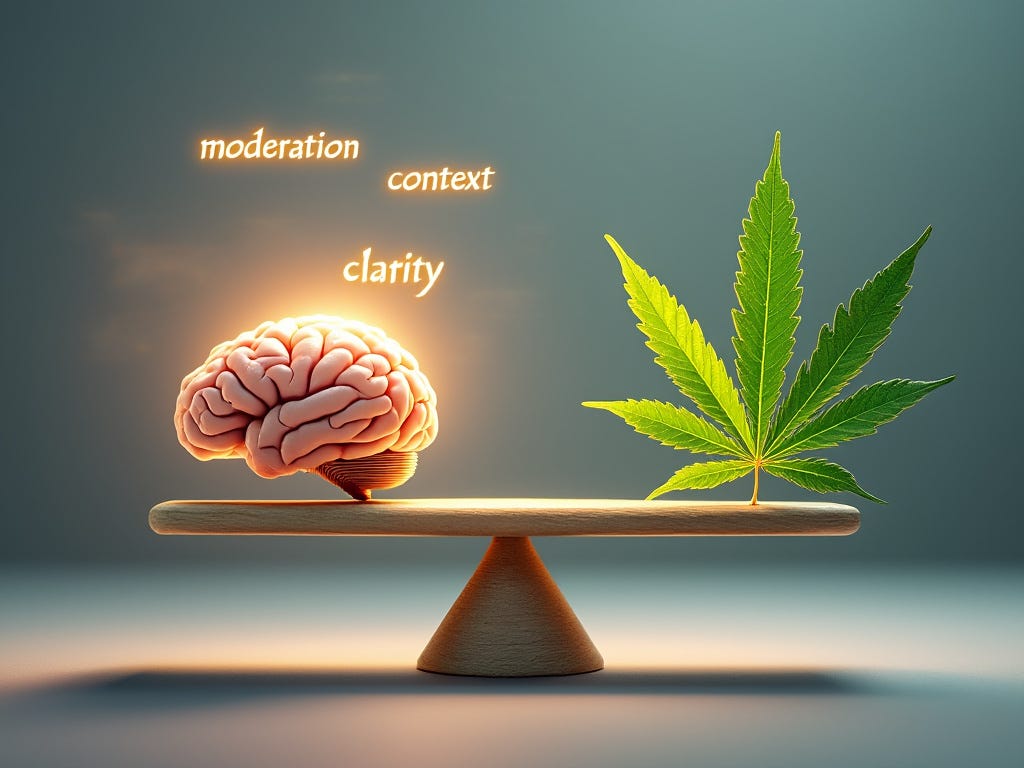Cannabis and Cognition: Not the Brain Drain You’ve Been Warned About
A 44-Year Study Flips the Script on Cannabis and Mental Decline—Could THC Actually Spare Your Smarts?
Peeling Back the Myths of Cannabis and Cognition
For decades, cannabis has been painted as the ultimate villain in the story of cognitive decline. Remember Nancy Reagan’s ominous warnings about frying your brain? Entire generations grew up believing that a single puff of cannabis could tank your IQ and leave your memory in tatters. This narrative, baked into societal stigmas and amplified by cherry-picked alarmist studies, still lingers today—just look at some of this week’s headlines.
But now, as cannabis steps out of the shadows of prohibition and into the medicinal spotlight, science is finally catching up to reevaluate these long-held assumptions. Enter a groundbreaking longitudinal study spanning 44 years and over 5,000 Danish men. Titled “Cannabis Use and Age-Related Changes in Cognitive Function From Early Adulthood to Late Midlife in 5162 Danish Men,” this study could rewrite the script entirely.
And this isn’t your average slapdash experiment. Methodologically meticulous and transparently conducted, it asks the burning question: does lifetime cannabis use really impact cognitive decline? The answer isn’t just a surprising “no”—it’s an eyebrow-raising “maybe cannabis users actually fare a little better.”
In this review, I’ll unpack the study’s findings, highlight key takeaways for those who prefer the unfiltered truth, and explore what these results mean for real life. Spoiler alert: this isn’t a story of harm, but a testament to the incredible resilience of the human brain.
The Study at a Glance
The Danish cohort study followed 5,162 men from early adulthood (around age 20) to late midlife (around age 64). Researchers used IQ as the primary benchmark for cognitive function, comparing changes in IQ scores over decades between cannabis users and non-users.
Here’s what they found:
These results don’t suggest cannabis is a brain booster, but they thoroughly undermine the long-held belief that using cannabis is a one-way ticket to cognitive dysfunction.
Side Bar: Is IQ a Fair Measure?
IQ provides a standardized way to track cognitive trends across decades, making it practical for long-term studies like this one. However, IQ is only part of the picture—it misses areas like executive function, attention, and real-world decision-making. While it’s a helpful tool, IQ alone doesn’t define cognitive health. Think of it as one piece of a much larger puzzle.
Making It Relatable: What This Means for Everyday Life
Who Benefits Most From This Study?
If you’ve worried that experimenting with cannabis in your youth doomed you to a foggy-headed future, this study offers some relief. Maybe you’re the person who dabbled in college and now wonders if those late-night study sessions came at a cost. According to this study, your brain likely bounced back just fine.
It’s also a reassuring read for older adults who use cannabis medicinally for chronic pain, anxiety, or sleep. If you’ve ever worried that years of occasional cannabis use have “caught up” to your brain, the results say otherwise: you’re probably fine.
But let’s not get carried away. This study isn’t a free pass to reckless cannabis use. While cognition might hold steady, heavy or habitual use can still lead to dependency, impaired decision-making, and other risks. As always, moderation and mindfulness are key.
Quick Hits: What You Need to Know
Cannabis isn’t frying your brain. The long-held myth of brain-frying cognitive doom doesn’t stand up to scrutiny.
Cognitive health is about the whole picture. Lifestyle choices, education, and mental health matter far more than cannabis.
Moderation matters. Too much of anything—even kale—isn’t a good thing.
The Value of this Learning: How Can It Help You?
Redefining Harm: The idea that cannabis destroys your brain just doesn’t hold water anymore. For everyday cannabis users—or the canna-curious—this finding might take the edge off some of the fear.
Balancing Choices: If cannabis helps you sleep, eases chronic pain, or reduces anxiety, you can feel more confident in using it without undue worry about “damaging” your brain.
Context Matters: This study reminds us that cognitive aging depends on many factors—education, mental health, parenting styles, and socioeconomic support—far more than occasional cannabis use.
Flipping the Script: A New Narrative
For years, cannabis was the scapegoat for cognitive decline, reinforcing stigma and shame. This study offers a new perspective: compassion, understanding, and data-driven discussions about cannabis use.
Who’s Flipping the Script?
Patients with a History of Use: For those haunted by the notion that cannabis ruined their potential, this study feels like vindication.
Older Adults Exploring Cannabis: Many worry about cognitive consequences, but these findings suggest that thoughtful use can coexist with healthy aging.
Physicians and Caregivers: Equipped with nuanced science, clinicians can have more balanced conversations with patients.
The Punch
This study doesn’t just challenge the stigma around cannabis—it dismantles it. By taking a long-term, patient-first approach, it shows that cannabis use over decades doesn’t necessarily spell cognitive doom.
Cannabis might not turn you into Einstein, but it’s far from the mental menace we’ve long feared. For the millions of patients turning to cannabis to manage chronic conditions, this is a reassuring win.
What if we stopped approaching cannabis with fear and embraced informed choice? This study suggests it’s time to do exactly that.















Question from Linkedin: "Opinion on this?
Kurzgesagt just published a new video.
THC-potency, amount and starting at an early age does seems to matter - for some users."
https://youtu.be/qBRaI0ZeAf8
Question from LinkedIn: "Haven’t read through yet, but was it a double blind study? Glad to hear it does take into account socioeconomic factors."
No, a double blind study wouldn’t be able to find these data.
Me: It was a longitudinal cohort study analyzing the relationship between cannabis use and cognitive decline over a mean interval of 44 years.
Data collection spans from military conscription assessments (1967–1989) to follow-ups (2015–2022).
Participants were 5162 Danish men, part of the Danish Aging and Cognition (DanACo) cohort.
It was a multi-center collaboration led by University of Copenhagen, incorporating Danish health registries.